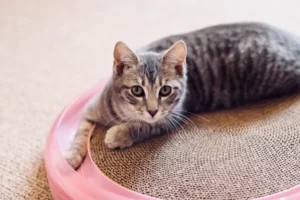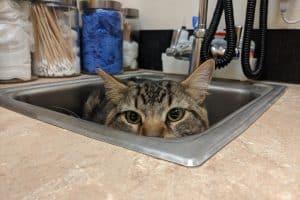Cats can be finicky creatures, and when you notice your feline friend having trouble controlling her bladder, it can be concerning. So, why can’t your cat control her bladder? Let’s find out.
Possible Medical Issues
If your feline friend is having trouble controlling her bladder, it could be due to various medical issues. One common culprit is a urinary tract infection, which can cause discomfort and frequent urination. Another possible cause could be the formation of bladder stones, which can obstruct the flow of urine and lead to accidents. It’s essential to consult with your veterinarian to rule out any underlying medical conditions that may be contributing to your cat’s bladder problems.
Behavioral Factors
Apart from medical issues, behavioral factors can also play a role in your cat’s inability to control her bladder. Stress is a significant factor that can lead to urinary problems in cats. Changes in the household, such as moving to a new place or introducing a new pet, can cause stress and result in litter box issues. Additionally, inadequate litter box hygiene or location can also impact your cat’s bladder habits. Ensuring a clean and comfortable litter box environment is crucial for your cat’s well-being.
- Anxiety and Fear: Cats are sensitive creatures and can be easily stressed by loud noises, unfamiliar visitors, or changes in routine. These stressors can lead to bladder control problems, so it’s essential to create a calm and safe environment for your furry friend to alleviate any anxiety she may be experiencing.
Age-Related Concerns
As cats age, they may experience bladder control issues due to conditions like kidney disease or cognitive dysfunction. These age-related concerns can impact your cat’s ability to control her bladder effectively. If you notice your senior cat having accidents or struggling to make it to the litter box in time, it may be a sign of underlying health issues that need to be addressed promptly. Regular check-ups with your veterinarian can help identify and manage these age-related conditions, giving your cat the support she needs to maintain good bladder control in her later years.
Dietary Considerations
Explore how your cat’s diet can impact their bladder health and what changes you can make to promote better control. Ensuring your cat stays properly hydrated is key to maintaining healthy bladder function. Feeding a balanced diet that meets your cat’s nutritional needs is also essential. Consider switching to a specially formulated urinary health diet if your cat is prone to urinary tract issues. Avoid feeding your cat foods high in magnesium and phosphorus, as they can contribute to bladder problems. Making these dietary adjustments can help support your cat’s bladder health and improve her control over her bladder functions effectively.
Additional Insight: When it comes to your cat’s diet, consider adding more moisture to her meals. Wet food can help increase your cat’s water intake, which is crucial for maintaining proper bladder function. This small change can make a big difference in your cat’s overall bladder health and control.
Environmental Factors
If you’re wondering why your cat can’t seem to control her bladder, take a look around her living environment. One common issue is the cleanliness of the litter box. Cats are meticulous creatures, and if their litter box is dirty or not up to their standards, they may avoid using it altogether, leading to accidents around the house.
Another factor to consider is any recent changes in your cat’s routine or surroundings. Cats are creatures of habit, and even a seemingly small change can stress them out and impact their bladder control. This could include moving to a new home, introducing a new pet, or even just rearranging the furniture.
To help your cat regain control of her bladder, make sure her litter box is clean and easily accessible. Consider adding additional litter boxes around the house if she’s having trouble making it to the one she normally uses. Creating a calm and consistent environment for your cat can go a long way in helping her feel comfortable and secure.
Tips for Helping Your Cat
- Monitor Water Intake: Keep an eye on how much water your cat is drinking. Increased water intake could be a sign of an underlying medical condition that is affecting her bladder control.
- Regular Vet Check-ups: Schedule regular check-ups with your veterinarian to rule out any health issues that may be causing your cat’s bladder control issues.
- Behavioral Training: If your cat is exhibiting inappropriate urination behaviors, consider working with a professional behaviorist to address the issue.
- Comfortable Litter Box: Make sure your cat’s litter box is the right size for her and is in a quiet, private location.
- Consistent Routine: Cats thrive on routine, so try to keep feeding, playtime, and litter box cleaning on a consistent schedule to help your cat feel secure and in control.
Remember, patience is key when helping your cat with bladder control issues. With a little time and effort, you can create a comfortable and stress-free environment for your feline friend.
When to See a Vet
If your cat is struggling to control her bladder, it’s essential to know when it’s time to seek help from a veterinarian. A clear sign that a vet visit is necessary is if your cat is experiencing frequent accidents outside of the litter box, excessive meowing while using the litter box, or noticeable blood in the urine. It’s crucial to take action promptly to identify the root cause of your feline friend’s bladder issues and provide appropriate treatment.
Additionally, if your cat is showing signs of distress, discomfort, or pain while urinating, or if there are sudden changes in her urination habits, these are red flags that warrant a trip to the vet. Remember, your cat’s health and well-being are a top priority, so don’t hesitate to seek professional help if you have concerns about her bladder control.
Lastly, if your cat is older or has a history of medical conditions that may affect her bladder function, regular check-ups with a vet become even more crucial. Your veterinarian can monitor her condition closely, provide tailored advice, and recommend treatment options to keep her comfortable and healthy.
The Importance of Regular Check-Ups
Routine veterinary visits play a significant role in maintaining your cat’s overall health and well-being, including her bladder function. Regular check-ups allow your vet to monitor any changes in your cat’s health, catch potential issues early on, and provide preventive care to keep her in optimal condition.
During these check-ups, your vet can perform physical exams, blood tests, and urinalysis to assess your cat’s overall health, including checking for any underlying conditions that may be impacting her bladder control. Early detection of any problems is key to addressing them effectively and preventing further complications down the line.
Moreover, veterinarians can provide guidance on proper diet, hydration, and litter box management to support your cat’s bladder health. By scheduling regular check-ups, you’re not only helping your cat stay healthy but also being proactive in addressing any potential bladder issues before they escalate.
Remember, your vet is your partner in ensuring your cat’s well-being, so make regular check-ups a priority to keep your feline companion happy and healthy for years to come.
Alex, a passionate animal lover, has experience in training and understanding animal behavior. As a proud pet parent to two dogs and three cats, he founded AnimalReport.net to share insights from animal experts and expand his knowledge of the animal kingdom.









